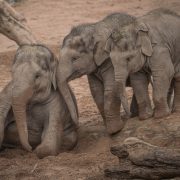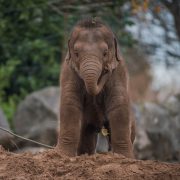The strong family bonds of elephants is an attribute that many people resonate with and love about them. In the wild, both Asian and African elephants live in distinct social groups, where female elephants stay together in family groups for the length of their lives.
Family groups are made of mothers, calves, sisters, aunts and grandmothers; and because of this the females develop strong bonds with one another. Elephants are actually one of the few species that learn life skills from watching each other, making having strong bonds with family members important. In these family groups, females help each other care for and protect their calves, learn how to become good mothers, develop good social skills and share food and water resources.
Rutendo is conducting her PhD at the University of Liverpool and has been studying our herd of Asian elephants for the past two years. Her project initially started as a Masters research project but it quickly became clear that understanding the social bonds of our elephants would take more than a three-month project! Rutendo explains:
“Elephants are such a complex species and that complexity deserves to be studied in great detail if we are to improve their well being. Thankfully, I was able to pursue my research further as a PhD project. I really admire Chester Zoo’s desire to marry conservation science and animal husbandry, and learning from experts of both fields has been a great experience so far.”
Aiming to develop a tool able to measure the strength of the bonds between elephants in zoos, Rutendo has been collecting behaviour data on our elephant herd for the past two years. Within that time she was able to quantify the bonds each female has with her herd mates and was also able to observe how major life events, such as births, affected the strength of these bonds.
She noticed that having new calves has not only created new bonds in the herd, but it has also increased cooperation and strengthened relationships between the females as they work together to care and protect their infants.
My best memory of working with Chester Zoo’s elephant herd so far has been watching the calves grow. Did you know that elephant calves throw tantrums? I didn’t until I started watching this herd! The calves usually throw a tantrum when their mothers decided they have had enough milk and walk away. But once one calf starts crying, all of them quickly join in until their mothers come and touch them with their trunks. It’s amusing and fascinating to watch!
Rutendo, PHD Student at University of Liverpool
OUR TEAM OF EXPERTS WORK IN SIX REGIONS AROUND THE GLOBE – REPRESENTING SOME OF THE PLANET’S MOST BIODIVERSE HABITATS. Discover more about our SCIENCE AND CONSERVATION work.



